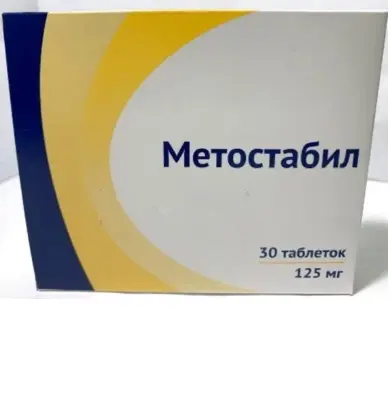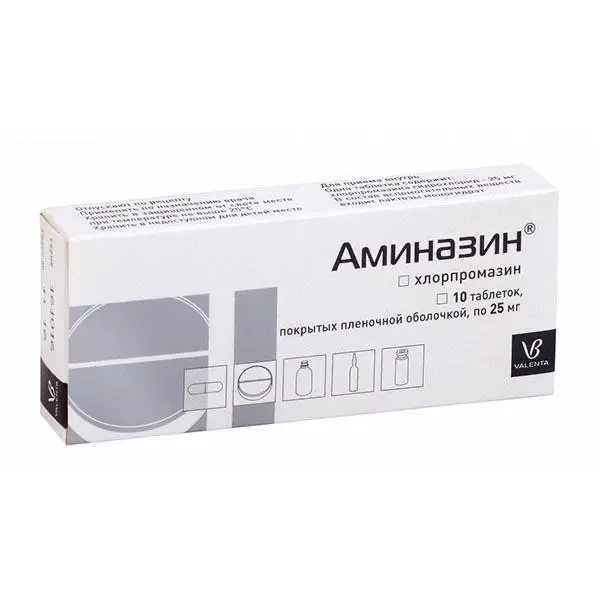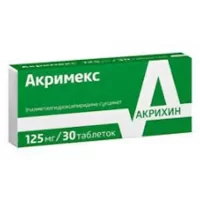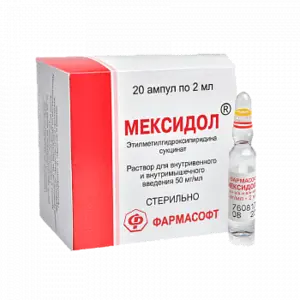Description
Metostabil Pharmacodynamics
Ethylmethylhydroxypyridine succinate is an inhibitor of free-radical processes, a membrane protector. It also has antihypoxic, stress-protective, nootropic, antiepileptic and anxiolytic effects. It belongs to the class of 3-oxypyridines.
The mechanism of action of ethylmethylhydroxypyridine succinate is due to its antioxidant and membrane-protective effects. The drug inhibits lipid peroxidation, increases superoxidoxidase activity, increases the lipid-protein ratio, improves the structure and function of cell membranes.
Ethylmethylhydroxypyridine succinate modulates the activity of membrane-bound enzymes (calcium-independent phosphodiesterase, adenylate cyclase, acetylcholinesterase), receptor complexes (benzodiazepine, GABA, acetylcholine), which increases their binding ability to ligands, helps maintain the structural and functional organization of biomembranes, transport neurotransmitters and improve synaptic transmission.
Ethylmethylhydroxypyridine succinate increases the content of dopamine in the brain.
Causes enhancement of compensatory activation of aerobic glycolysis and reduction of the degree of inhibition of oxidative processes in the Krebs cycle under hypoxia with an increase in ATP and creatine phosphate, activation of energy-synthesizing functions of mitochondria.
Increases resistance of the organism to various damaging factors under pathological conditions (hypoxia and ischemia, disorders of cerebral circulation, intoxication with ethanol and antipsychotic drugs).
Under conditions of critical reduction of coronary blood flow, it contributes to preservation of structural and functional organization of cardiomyocyte membranes, stimulates the activity of membrane enzymes – phosphodiesterase, adenylate cyclase, acetylcholinesterase.
It supports activation of aerobic glycolysis developing in acute ischemia and promotes under hypoxia restoration of mitochondrial redox processes, increases ATP and creatine phosphate synthesis. Ensures the integrity of morphological structures and physiological functions of ischemic myocardium.
Improves the clinical course of myocardial infarction, increases the effectiveness of therapy, reduces the incidence of arrhythmias and intracardiac conduction abnormalities.
Normalizes metabolic processes in ischemic myocardium, increases the antianginal activity of nitrates, improves blood rheological properties, reduces the effects of reperfusion syndrome in acute coronary failure.
It reduces enzymatic toxemia and endogenous intoxication in acute pancreatitis.
Improves metabolism and blood supply to the brain, microcirculation and rheological properties of blood, reduces platelet aggregation. It stabilizes blood cell membranes (erythrocytes and platelets), reducing the likelihood of hemolysis. It has hypolipidemic effect, reduces total cholesterol and low-density lipoproteins.
Indications
– Consequences of acute cerebral circulatory disorders, including after transient ischemic attacks, in the subcompensation phase, as preventive courses;
– Mild craniocerebral trauma, the consequences of craniocerebral injuries;
– encephalopathies of various genesis (dyscirculatory, dysmetabolic, posttraumatic, mixed);
– vegetative dystonia syndrome;
– Mild cognitive disorders of atherosclerotic genesis;
– Anxiety disorders in neurotic and neurosis-like conditions;
– Coronary heart disease (as part of complex therapy);
– relief of withdrawal syndrome in alcoholism with a predominance of neurotic and vegetative vascular disorders, postabstinence disorders;
– states after acute intoxication with antipsychotic drugs;
– Asthenic conditions, as well as for the prevention of the development of somatic diseases under the influence of extreme factors and stress;
– Effects of extreme (stress) factors.
Contraindications .
– Hypersensitivity to the drug;
– acute hepatic failure;
– acute renal failure;
– childhood.
Pregnancy and lactation:
The drug is contraindicated in pregnancy and during breast-feeding because of insufficient data on drug efficacy and safety during these periods.
Directions for use and dosages.
- Orally, 125-250 mg 3 times a day; maximum daily dose is 800 mg (6 tablets). Duration of treatment is 2-6 weeks; for stopping alcohol withdrawal – 5-7 days.
- Treatment is discontinued gradually, reducing the dose over 2-3 days.
- The initial dose is 125-250 mg (1-2 tablets) 1-2 times a day with a gradual increase to obtain therapeutic effect; the maximum daily dose is 800 mg.
- The duration of therapy in patients with coronary heart disease is at least 1.5-2 months.
- Repeated courses (as recommended by a physician) should preferably be carried out in spring and fall periods.





